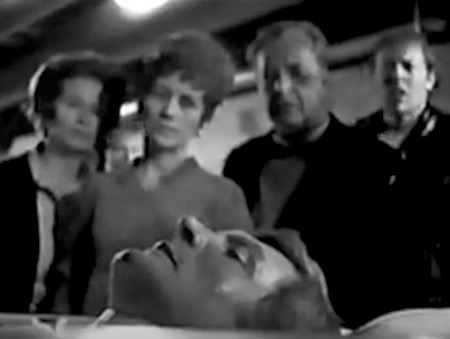While the 1971 telefilm Duel was the first standalone feature-length project that Steven Spielberg made as a professional, he directed two other pieces with commensurate running times the same year, namely the first weekly episode of the long-running detective series Columbo and this installment of a series called The Name of the Game. Given how central science fiction subsequently became in Spielberg’s work, L.A. 2017 is of particular interest. Additionally, L.A. 2017 plays like standalone piece because its only narrative connection to The Name of the Game is protagonist Glenn Howard (Gene Barry), who time-travels away from the series’ modern-day milieu for the duration of this adventure.
While driving through smoggy canyons in Los Angeles, socially conscious magazine publisher Glenn succumbs to noxious fumes and crashes his car. Emergency personnel wearing gas masks and protective suits extract Glenn from his vehicle and drive him to a sprawling underground campus. Through interactions with psychiatrist/policeman Cameron (Severn Darden) and high-powered politician Bigelow (Barry Sullivan), Glenn learns that he’s in the Los Angeles of the future, and that civilization has been driven underground by environmental degradation. Per the talky script by Philip Wylie, what ensues has more exposition than excitement. In this grim future, America functions as a corporation with totalitarian control over citizens. People exchange math equations instead of jokes, much of the population is sterile, and everyone is under constant surveillance. Given Glenn’s unique status as a man out of time, Bigelow asks him to become a propogandist for the government, but he rebels—with the assistance of Sandrelle (Sharon Farrell), an attractive woman assigned to be Glenn’s consort.
Watching L.A. 2017, it’s possible to discern why the piece, in tandem with Spielberg’s other 1971 work, helped raise his profile—the director does a lot with a little. Frenetic movement and tight angles make scenes in underground tunnels feel appropriately claustrophobic, and Spielberg guides actors portraying villains to underplay, which adds to the general air of menace. Moreover, the piece’s biggest shortcomings (flat scripting, meager budget) originated above the young director’s pay grade. While nowhere near as revelatory as Duel, this piece demonstrates that even in his earliest efforts, Spielberg had a formidable skillset. No wonder he graduated to theatrical features after a relatively short run as a Universal Television worker bee.
L.A. 2017: FUNKY




